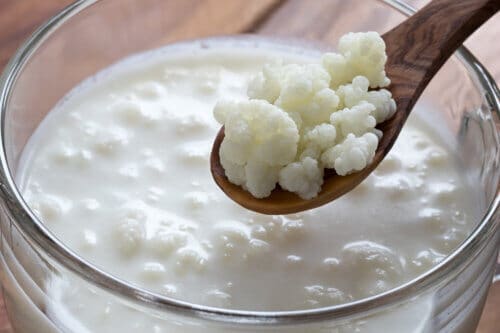מBehind the development stands Prof. Tamir Toler from the Department of Biomedical Engineering at the Ivy and Alder Fleishman Faculty of Engineering, who together with the foodtech entrepreneur Dr. Eyal Efergan founded the start-up company 'Imagandiri' ("Imaginary Milk"), which is trying to The impossible: to produce cow's milk from yeast

Is a new technological development by Tel Aviv University researchers likely to soon change the way we consume dairy products? The initiators of the development estimate that in the near future, we will be able to buy dairy products in the supermarket that will be identical in taste and color to the regular dairy products we consume, but with one small difference: these dairy products will be produced from yeast and not from cow's milk. Prof. Tamir Toler is behind the development from the Department of Biomedical Engineering At the Ivy and Alder Fleishman Faculty of Engineering, who together with foodtech entrepreneur Dr. Eyal Efergan founded the start-up company 'Imagandiri' ("imaginary milk"), which is trying to do the impossible: produce cow's milk from yeast.
Protect the environment and prevent harm to animals
In recent years, with the awareness of the environmental, health and moral damage of the dairy industry, biotechnology companies all over the world are looking for milk substitutes. The 'Imagandiri' company recognized the potential in the use of protein development for the food industry, and with the help of the connection to Tel Aviv University andRamot company (Tel Aviv University's Technology Commercialization Company), works to develop and produce milk proteins, which are identical to the milk proteins we all know, with the aim of freeing the dairy industry from its dependence on animals.
"Imagandiri's goal is to produce cultured milk, which will preserve all the important nutritional values of animal milk, with the same taste, smell and texture we are all familiar with, but without the suffering caused to the cows and without the environmental destruction," explains Prof. Toler. In fact, the milk and cheeses of 'Imagandiri' will be much healthier than animal milk products, since they will not contain cholesterol, lactose or somatic cells.
"Our startup also includes food engineers and food experts from the Strauss company," says Prof. Toler, "and these days they are trying to produce cheese from the milk proteins in the yeast. It is a long process of improving the yield and the taste, and of course the price as well. It should be understood that these are not milk substitutes such as almonds and soy. In the end, we aim to reach dairy products, which will be identical to animal products."
"Professor Toler's groundbreaking technology can bring about a significant change in the dairy industry as we know it today," says Keren Primor Cohen, CEO of Ramot.
create a protein through the process of gene expression
For about a decade, Prof. Toler's laboratory has been specializing in gene expression modeling, among other things by using simulations of intracellular processes, computational modeling of molecular evolution and dedicated algorithms. Among other things, these models are used to optimize and reduce the yield of heterologous proteins (proteins whose origin is from another organism). Prof. Toler's technology has previously been successfully tested in various organisms such as yeast, bacteria, microalgae and even viruses, to solve various problems such as the creation of vaccines, antibodies, biosensors and green energy.
"The genome of every living being contains genes, which encode the 'recipe' of proteins, i.e. its amino acid sequence. But it also contains information that encodes the complex process called 'gene expression', meaning the timing and rate of production of the proteins," explains Prof. Toler. "This gene expression is actually a process, which includes the transition from a 'dead' DNA sequence to proteins, which are the 'essence of life' itself and are a central component of every living thing we know, from humans, through the corona virus to cow's milk. For many years, biotechnology companies have harnessed the process in order to produce proteins cheaply, with the idea being to take a gene from one creature and plant it in the genome of another creature, so that it will serve as a 'factory' for the production of the protein encoded by this gene. This technology has been used for many years to produce medicines, vaccines, energy and is also used by the food industry."
Yeast as a milk protein factory
"Theoretically, it is possible to reach a situation where it is not possible to differentiate between cow's milk and preserved milk. But in order for this to be done economically, the yeast cells need to be made to become milk protein factories", Prof. Toler elaborates. "Although we know what the genes are that encode the proteins in cow's milk, if we take such a gene from a cow - the codes of gene expression that are encoded in it will be written in the 'language' of the cow's cells. Therefore the challenge is to rewrite the gene with codes that are suitable for preservation. This will make it possible to produce the milk proteins correctly, cheaply and efficiently in the 'factory' which is the yeast cell."
"With the help of the models we developed in the laboratory, we believe that before long we will be able to make Shemar produce milk proteins in an efficient way, which will also allow industrial, cheap and high-quality production. There have already been attempts to produce milk from microflora, but in order for a change to really take place, a situation must be reached where the yeast produces milk at a price that competes with the dairy industry. I believe that we are on the right path, and before long we will be able to make toast at home from yellow cheese, which was produced from yeast and not from cow's milk."
More on the subject on the science website:
